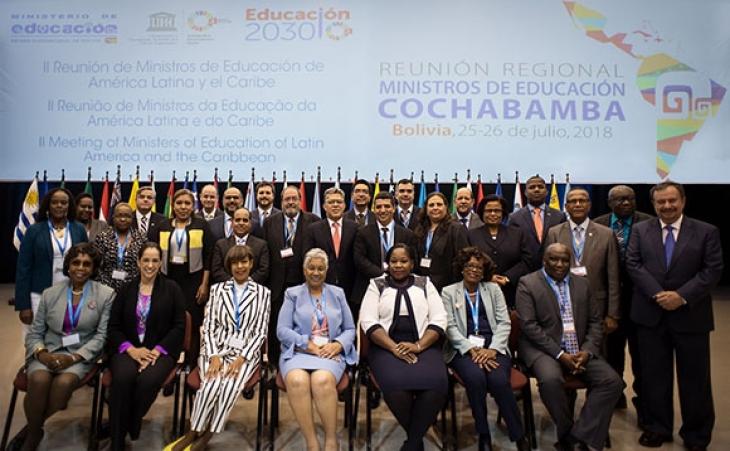
Ministers of Latin America and the Caribbean adopt Roadmap for moving towards quality, inclusive, equitable education

-
The Cochabamba Agreements: Regional Solidarity for Achieving SDG4-E2030 in Latin America and the Caribbean was approved at the II Regional Meeting of Ministers of Education of Latin America and the Caribbean “Transforming Education: A Joint Response from Latin America and the Caribbean for Achieving SDG4-E2030.”
-
Among other things, the document establishes the adoption of the Regional Roadmap for the Implementation of SDG4-E2030 in Latin America and the Caribbean, an instrument that will support the countries’ efforts to achieve the targets of Sustainable Development Goal 4, which refers to lifelong quality, inclusive, equitable education.
Education ministers and high-ranking officials from Latin America and the Caribbean approved the Cochabamba Agreements and the Regional Roadmap for the Implementation of SDG4-E2030 in Latin America and the Caribbean on 26 July 2018. The latter establishes a regional mechanism for moving towards Sustainable Development Goal 4 –Education 2030 together.
The Roadmap is a frame of reference for the design and execution of regional actions in education and contains recommendations for the national implementation of public policy on this issue. It also supports coordinated and coherent progress on priority issues for the countries of the region such as the quality of education, equity and inclusion, teachers and education workers and lifelong learning.
The document was prepared collectively during two technical monitoring meetings following the I Regional Meeting of Ministers of Education of Latin America and the Caribbean (Buenos Aires). Representatives of the countries of Latin America and the Caribbean on the SDG-E2030 Global Steering Committee (Argentina, Brazil and Bolivia), one Caribbean nation selected by GRULAC, the Group of Latin American and Caribbean Countries in the United Nations (Granada) and UNESCO and UNICEF, sub-regional and regional organizations (CARICOM, CECC-SICA, the OAS and OEI) and representatives of civil society (CLADE and Education International) also participated in these meetings.
A Commitment to Educational Integration
The Cochabamba Agreements were reached by the representatives of the countries that attended the regional meeting in Bolivia. They are based on the Buenos Aires Declaration (2017), the first milestone in the regionalization of SDG4-E2030 that allowed the countries to monitor the global decisions adopted in the Incheon Declaration emanating from the World Education Forum in May 2015 from this continent. The Buenos Aires Declaration provided a shared vision of the 2030 Education Agenda from Latin America and the Caribbean and was meant to generate strategies and programs that seek to achieve these targets at the national and regional levels for 2017-2030.
The countries agreed in Bolivia to create a mechanism for implementing the Roadmap. The executive secretariat will be the Regional Bureau for Education in Latin America and the Caribbean (OREALC/UNESCO Santiago). This mechanism consists of a Regional Steering Committee with two representatives from South America, two from Central America and Mexico, and three from the Caribbean, all of whom will be elected by the member states. UNESCO and UNICEF will serve as the permanent coordinating agencies of the committee and will receive support from regional inter-governmental organizations and two civil society organizations.
The Regional Steering Committee shall establish four working groups that will drive specific actions in review, monitoring and reporting; policy and strategies; awareness and communication; and finance and governance. The groups may seek the support of technical experts.
In the agreements, the officials agreed to strengthen intersectoral collaboration and to explore opportunities for the participation of young people and adults in regional coordination mechanisms. They also agreed to meet every two or three years and to entrust OREALC/UNESCO Santiago with organizing regional meetings in coordination with the Regional Steering Committee.
More information:
II Regional Meeting of Ministers of Education of Latin America and the Caribbean
July 25 and 26, 2018, Cochabamba, Bolivia.
********
In 2015 the UN adopted the 2030 Agenda for Sustainable Development, an opportunity for countries and their societies to embark on a new path to improve the lives for all and not leave anyone behind.
When the new agenda was approved in September 2015, the international community recognized that education was essential for the success of the 17 goals.
The ambitions for the field of education are reflected in an essential way in the Sustainable Development Goal 4, which aims to “ensure inclusive and equitable quality education and promote lifelong learning opportunities for all.”
Through the Incheon Declaration adopted at the World Education Forum in May 2015, UNESCO, as the United Nations’ specialized agency for education, was entrusted to lead and coordinate the Education 2030 agenda with its partners.
The roadmap to achieve the ten targets of the education goal is the Education 2030 Framework for Action, adopted in November 2015, which provides guidance to governments and partners on how to turn commitments into action.




